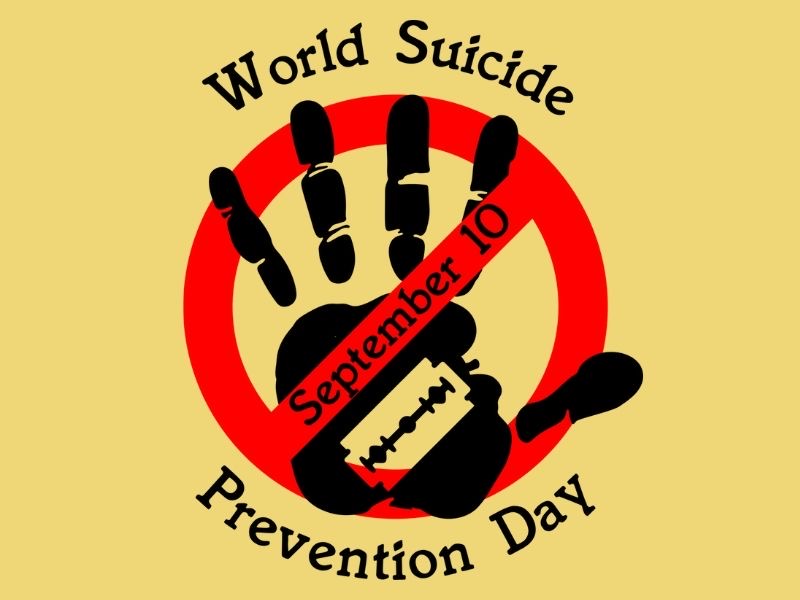Eduard Abashiya, a lecturer at the Department of Psychology at the Dnipro Institute of PJSC "IAPM", a lawyer, psychologist at the Amur-Nyzhnodniprovskyi District Department of the State Institution "Probation Center" in Dnipropetrovsk region, and a member of the International Association of Psychologists and Consultants on Sexual Education, provides the following information. World Suicide Prevention Day, observed annually on September 10th, is dedicated to preventing suicides worldwide. According to the International Association for Suicide Prevention (IASP), this day promotes awareness and mitigation of suicide consequences, and serves as a forum for scientists, mental health professionals, crisis workers, volunteers, and suicide survivors.
According to World Health Organization (WHO) statistics, nearly 800,000 people die by suicide each year. Even more shocking is that for every suicide, there are over 20 suicide attempts made by each victim.
Suicides occur throughout the lifespan and were the second leading cause of death among 15-29 year-olds globally in 2016. Suicides do not just occur in high-income countries, but are a global phenomenon in all regions of the world. In fact, over 79% of global suicides in 2016 occurred in low- and middle-income countries.

Research shows that hanging, pesticide poisoning, self-immolation, firearms, drowning, and drug overdose are among the most common methods of suicide in countries worldwide.
Depression is a common disorder that is treatable. There are various means of treating depression. One should try to use psychotherapy or medication with first-line drugs before conducting other interventions.
The most serious (severest) complication of depression is suicide.
It is very important to identify the behavior of a person who has suicidal thoughts. Signs and symptoms include "loss of appetite and sleep, irritable behavior, lifestyle changes, alienation, talking about negative things, hopelessness, loneliness, lack of concern, expressing feelings of failure, worthlessness, anger, etc. The best way a family member, relative, or friend can provide immediate help is to listen, understand, and provide unconditional support and moral assistance to the person.
Sharp objects, poisons and chemicals, strong medications, certain items (photographs, toys, letters, etc.) that can trigger suicidal actions should be kept away from people with suicidal thoughts. They should not be allowed to stay in a room alone; they should be surrounded by other people. If they have a separate room, all latches should be unlocked to keep the person safe, at least until consultation with a specialist (psychologist, psychotherapist, psychiatrist).
Suicide is a tragic act that demonstrates despair, and its prevention requires further care and attention to this issue, including in communities, as well as among family members, caregivers, and others.
Timely, effective actions by all stakeholders - governments, civil society, communities, families, and individuals - can provide hope and reduce suicidal behavior.
Suicide prevention requires key effective, evidence-based measures. In this context, WHO recommends the following actions:
- limit access to means of suicide, such as pesticides, firearms, certain medications, etc.
- interact with the media for responsible coverage of suicide cases.
- develop socio-emotional life skills in adolescents.
- ensure early identification, assessment, management, and follow-up of anyone affected by suicidal behavior.
Creating hope through action includes raising awareness about suicide prevention and reducing the stigma surrounding suicide.
On World Suicide Prevention Day, WHO calls on governments, communities, families, civil society, and individuals to contribute to creating hope and be a light demonstrating support for all those who have lost loved ones to suicide and those who have survived.
Creating hope through action provides people with suicidal thoughts evidence that there are alternatives to suicide and helps people restore their passion for life.
One in five people thinks about suicide at some point during their lifetime. This doesn't necessarily mean the presence of a mental disorder, but in many cases, there is a connection, as research has shown that a person experiencing depression is 20 times more likely to die by suicide than a person who doesn't suffer from depression.
Although the situation has changed significantly over the last decade, there are still stigma and myths that to some extent relate to suicide. Stigma and myths can prevent us from recognizing when someone is at risk.
Some things to consider:
Talking about suicide can be a plea for help; never assume they won't take their own life - always take their feelings seriously. Most people who feel suicidal don't actually want to die; they want the situation they're in to stop. Much can be done to prevent suicide with timely support.
Don't be afraid to ask direct questions - are you thinking about ending your life? Listen, show that you care, be non-judgmental, try to find out the reasons for such thoughts, encourage living for today rather than focusing only on the negative, problems, troubles, and difficulties of life, ask if they have plans and dreams for the end of life, encourage seeking professional help.
If you sense immediate danger, make sure these people are not left alone, and seek professional help yourself. Don't ignore your intuition, - noted psychologist Eduard Abashiya.
 Eng
Eng  Укр
Укр 